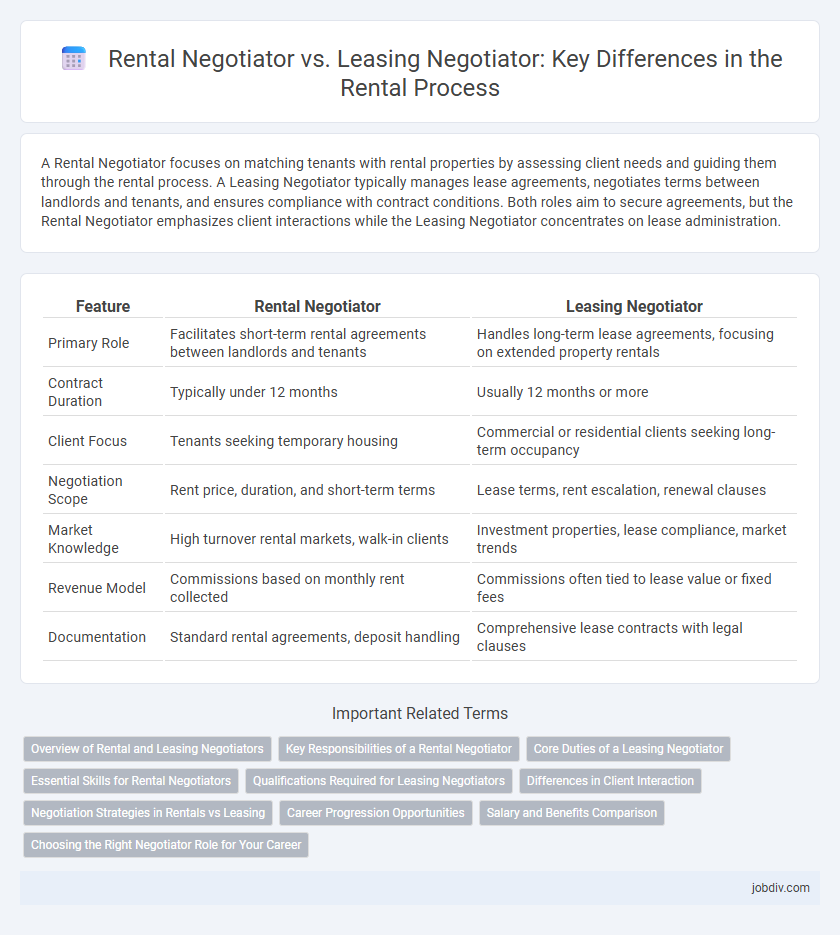A Rental Negotiator focuses on matching tenants with rental properties by assessing client needs and guiding them through the rental process. A Leasing Negotiator typically manages lease agreements, negotiates terms between landlords and tenants, and ensures compliance with contract conditions. Both roles aim to secure agreements, but the Rental Negotiator emphasizes client interactions while the Leasing Negotiator concentrates on lease administration.
Table of Comparison
| Feature | Rental Negotiator | Leasing Negotiator |
|---|---|---|
| Primary Role | Facilitates short-term rental agreements between landlords and tenants | Handles long-term lease agreements, focusing on extended property rentals |
| Contract Duration | Typically under 12 months | Usually 12 months or more |
| Client Focus | Tenants seeking temporary housing | Commercial or residential clients seeking long-term occupancy |
| Negotiation Scope | Rent price, duration, and short-term terms | Lease terms, rent escalation, renewal clauses |
| Market Knowledge | High turnover rental markets, walk-in clients | Investment properties, lease compliance, market trends |
| Revenue Model | Commissions based on monthly rent collected | Commissions often tied to lease value or fixed fees |
| Documentation | Standard rental agreements, deposit handling | Comprehensive lease contracts with legal clauses |
Overview of Rental and Leasing Negotiators
Rental negotiators specialize in securing short-term leases and facilitating tenant-landlord agreements for residential or commercial properties, emphasizing quick turnover and flexible terms. Leasing negotiators focus on long-term lease contracts, often involving detailed negotiations on lease duration, terms, and renewals, primarily for commercial or multi-unit residential properties. Both roles require strong communication skills and market knowledge but differ in contract length and client engagement strategies.
Key Responsibilities of a Rental Negotiator
A Rental Negotiator primarily manages tenant inquiries, negotiates rental terms, and facilitates property viewings to secure lease agreements efficiently. They focus on understanding tenant needs, matching suitable properties, and ensuring compliance with rental policies and legal requirements. Their role involves coordinating with landlords and tenants to finalize rental contracts, emphasizing timely communication and customer satisfaction.
Core Duties of a Leasing Negotiator
A Leasing Negotiator primarily focuses on securing tenants for residential or commercial properties by managing viewings, explaining lease terms, and conducting background checks. They play a crucial role in drafting and finalizing rental agreements, ensuring compliance with legal and financial requirements. Unlike Rental Negotiators who might handle short-term rentals, Leasing Negotiators specialize in long-term lease arrangements, emphasizing tenant retention and lease renewals.
Essential Skills for Rental Negotiators
Rental negotiators excel in communication, market knowledge, and client relationship management, essential for securing tenant agreements. Leasing negotiators focus more on contract terms and legal compliance, but rental negotiators prioritize negotiation skills and property presentation to maximize occupancy rates. Mastery of local rental laws and proficiency in digital marketing platforms enhance a rental negotiator's effectiveness in closing deals swiftly.
Qualifications Required for Leasing Negotiators
Leasing negotiators typically require a deep understanding of real estate laws, property management, and strong interpersonal skills to effectively mediate between landlords and tenants. Essential qualifications include a background in business or real estate, certification in property leasing or real estate brokerage, and proficiency in negotiation tactics. Experience in contract management and knowledge of local rental market trends further enhance a leasing negotiator's ability to secure favorable lease terms.
Differences in Client Interaction
Rental negotiators primarily engage with individual tenants to discuss short-term lease terms, rent prices, and rental conditions, ensuring a personalized rental experience. Leasing negotiators work more closely with property owners and corporate clients, coordinating longer-term agreements and focusing on contract specifics and property management requirements. The client interaction in rental negotiation is often more tenant-focused and frequent, while leasing negotiation involves detailed communication with businesses and landlords for strategic lease arrangements.
Negotiation Strategies in Rentals vs Leasing
Rental negotiators focus on short-term rental agreements, employing flexible negotiation strategies that prioritize tenant turnover rates and market demand fluctuations. Leasing negotiators handle long-term contracts, emphasizing stability and thorough vetting processes to secure reliable tenants and minimize vacancy periods. Effective negotiation in rentals often involves dynamic pricing and incentives, while leasing negotiations leverage fixed terms and maintenance responsibilities to optimize property value.
Career Progression Opportunities
Rental negotiators often start by managing short-term lease agreements and tenant communications, developing skills in client relations and contract negotiation. Leasing negotiators handle longer-term leases and commercial properties, offering greater exposure to complex transactions and strategic property management. Career progression typically leads rental negotiators toward leasing roles, property management, or real estate consultancy, with leasing negotiators positioned for senior management or portfolio oversight in real estate firms.
Salary and Benefits Comparison
Rental negotiators typically earn a base salary ranging from $30,000 to $45,000 annually, with commissions based on successful lease agreements, while leasing negotiators often receive slightly higher base pay between $35,000 and $50,000, reflecting their role in securing longer-term contracts. Benefits for rental negotiators frequently include performance bonuses, flexible scheduling, and commission incentives, whereas leasing negotiators may access enhanced benefits such as healthcare packages, retirement plans, and exclusive leasing bonuses. Salary and benefits depend significantly on location, company size, and experience, with leasing negotiators generally enjoying more comprehensive compensation due to the strategic nature of their role.
Choosing the Right Negotiator Role for Your Career
Rental negotiators specialize in securing tenants for residential or commercial properties, focusing on short-term lettings and tenant relations. Leasing negotiators handle longer-term lease agreements, often involving commercial properties and negotiating terms that protect landlords' and tenants' interests over extended periods. Choosing the right negotiator role depends on your career goals, whether you prefer fast-paced tenant interactions or complex lease negotiations with strategic planning.
Rental Negotiator vs Leasing Negotiator Infographic

 jobdiv.com
jobdiv.com